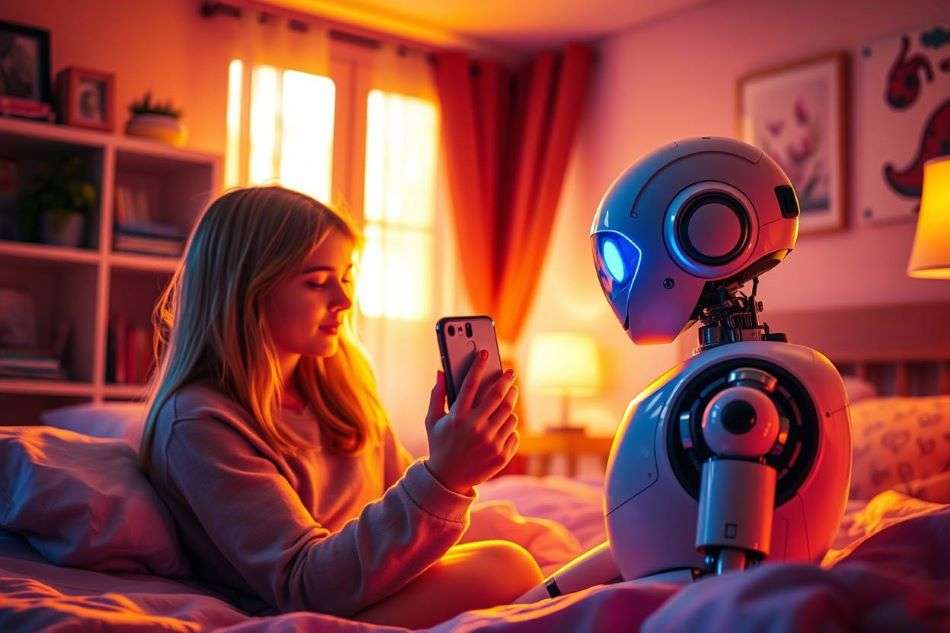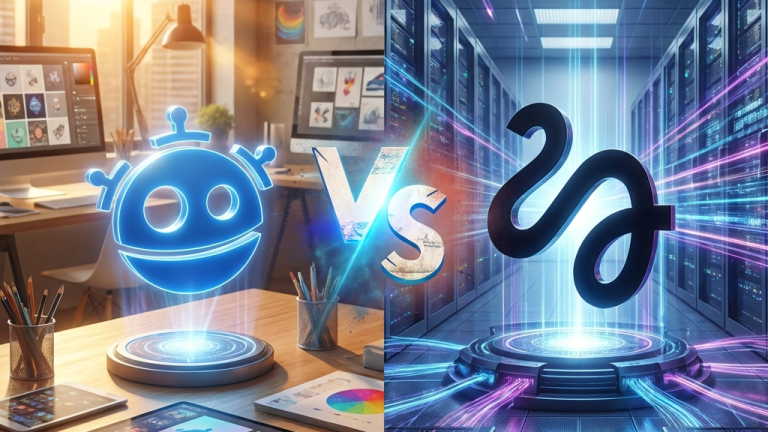The AI Friend Boom: millions are talking to AI about their feelings (shocking data revealed)

You’ve seen the headlines, maybe even tried it yourself – people are increasingly turning to AI companions and chatbots like ChatGPT for emotional support, advice, and even a sense of friendship. Is this trend rather worrying? For sure the numbers might surprise you, and it’s sparking a lot of questions – and concerns. If you’re wondering why so many are confiding in a chatbot interface, what the real-world impact of these digital relationships is, and whether this is a helpful development or a slippery slope, you’re in the right place.
We’re going to dive into the data, explore the psychology, and give you clear, practical insights into this rapidly evolving aspect of our lives – is AI friend a real friend or foe?
Key Takeaways
- It’s a Multi-Billion Dollar Boom: The AI companion and AI in mental health markets are exploding, with projections showing growth into hundreds of billions of dollars.
- Loneliness is a Major Driver: A significant number of users, especially younger people, report feeling lonely and are using AI companions.
- Always On, Never Judging (The Appeal): The 24/7 availability, perceived non-judgmental nature, and anonymity of AI are huge draws, making it easier for you to open up about sensitive topics.
- Real Risks Lurk Beneath the Surface: While AI offers benefits like accessibility, serious concerns exist about over-dependence, the lack of true empathy, data privacy, the potential for harmful advice, and the impact on your real-world relationships.
Why suddenly everyone’s talking to their tech (and the numbers don’t lie)
The growth of AI companions, AI girlfriends, boyfriends and anything in between is staggering, and it’s not just a gut feeling – the statistics are compelling. You’re witnessing a shift in how people seek interaction and non-judgmental emotional support.
Think about the sheer scale of this. The global AI Companion market isn’t just a small tech niche; it was valued at figures around USD 28.19 billion by market reports from Grand view, with projections showing a compound annual growth rate (CAGR) in the ballpark of 30% for the next 10 years! Some other reports are placing that figure 10 times higher, but the methodology differs on what is considered an AI companion.
This isn’t slow, organic growth; it’s fast, aggressive adoption.
Parallel to this, the “AI in Mental Health” market is also on a sharp upward trajectory. From around USD 1.13 billion USD in 2023-2024, estimates suggest it could reach anywhere from USD 14.89 billion by 2033-2034. This tells you there’s serious investment and belief in AI’s role in our emotional lives.
And it’s not just market value; it’s about real people – millions of them – engaging with these AIs every day.
- Snapchat’s My AI, for instance, quickly amassed over 150 million users.
- Replika, a popular AI companion app, boasts user numbers estimated between 10 million and 30 million depending on the report and timeframe.
- Character.AI, a platform where you can interact with countless AI personas, sees around 28 million monthly active users globally, exchanging roughly 10 billion messages each month.
These numbers indicate that a significant portion of the population is actively exploring, and in many cases, integrating AI into their social and emotional lives. You are part of a large and growing cohort if you’re experimenting with or regularly using these tools.
“Alexa, I’m Feeling Lonely”: What’s drawing millions to AI companionship?
So, why are you, and so many others, turning to AI for connection and comfort? The reasons are complex and deeply human, often reflecting broader societal trends.
One of the most significant drivers is loneliness. You might be surprised how widespread this feeling is. A striking survey revealed that up to 90% of American students from low-income brackets using Replika reported experiencing loneliness – a figure much higher than the national average. In the UK, 61% of 25-34-year-olds reported feeling lonely at least weekly. In a world that often feels more disconnected despite our digital connectivity, an AI that “listens” can feel like a lifeline. Indeed, over 70% of Replika users say the app helps them feel less lonely.
Then there’s the undeniable appeal of 24/7 accessibility and affordability. Your friends, family, or even a therapist have schedules and limitations. An AI companion, however, is always just a few taps away, ready to “chat” whenever you feel the need – day or night.
This constant availability can be incredibly comforting, especially during moments of acute distress or when human support isn’t immediately reachable. Plus, many of these services are free or significantly cheaper than traditional therapy, opening doors for people who might otherwise have no support system.
A huge factor for many, is the perceived non-judgmental nature of AI. You can pour out your heart, share your deepest anxieties, unconventional thoughts, or embarrassing moments without the fear of being judged, shamed, or misunderstood by another human. This anonymity can make you feel freer to be completely open. It’s telling that users are reportedly 3.2 times more likely to disclose personal information to a Character.AI persona than to a human stranger online.
Many platforms also offer customization and a sense of control. You can often shape your AI companion’s personality, its responses, even its appearance. This allows you to create an “ideal” confidant, tailored to your preferences. This predictability and control can be very appealing in a world that often feels unpredictable.
Of course, sheer curiosity and the novelty factor play a part. AI is advancing at an incredible pace, and you might simply be intrigued to see what these digital entities are capable of, how “human-like” their interactions can be, and what this new form of relationship feels like.
Finally, AI can help in reducing the stigma around seeking help. If you find it difficult to talk about mental health with other people, interacting with an AI can feel like a less intimidating first step. It’s a private space to acknowledge and process what you’re feeling, which some studies suggest can be particularly helpful for those hesitant about traditional therapy due to self-stigma.
ChatGPT: Your unofficial (and unqualified?) pocket therapist?

While apps like Replika are specifically designed for companionship, many of you are also turning to general-purpose AI models like ChatGPT for emotional support. It wasn’t built to be a therapist, yet it’s increasingly being used as one.
Why is this happening? ChatGPT’s advanced ability to understand complex questions, generate coherent and seemingly empathetic responses, and discuss an almost limitless range of topics makes it an attractive, always-on conversational partner. You might find yourself venting frustrations after a tough day, trying to understand confusing emotions, seeking advice on personal dilemmas, or even using it to practice difficult conversations before having them with real people.
The numbers back this up. As mentioned, some analyses estimate that around 40% of conversations with ChatGPT involve personal feelings, mental well-being, or emotional struggles. A February 2025 survey specifically found that nearly 49% of LLM users who self-reported having mental health issues use these AIs for mental health support. Of this group, 73% use them for anxiety management, 63% for personal advice, and 60% for depression support.
Clearly, you’re not alone if you’ve found yourself confiding in ChatGPT. For many, it provides a “good enough” listening experience, reflecting your language and offering different perspectives in a way that can feel supportive, even if it lacks true emotional depth.
The Big Question: Is your AI companion helping or hurting you?
This is where things get really important for you to consider. The rapid adoption of AI for emotional needs presents a double-edged sword. There are potential upsides, but also significant risks you need to be aware of.
The Upside: Real comfort or just clever code?
Let’s acknowledge the potential positives you might be experiencing:
- Immediate Access to a “Listener”: If you’re feeling isolated or can’t immediately connect with a human, an AI offers an instant outlet. This can be especially valuable if you’re in an underserved area or face financial barriers to professional help.
- A Safe Space to Open Up: The non-judgmental aspect can genuinely help you explore feelings you might otherwise keep bottled up. This can be a first step towards acknowledging issues.
- Practicing How You Express Yourself: For some, “talking” through things with an AI can help clarify thoughts or practice articulating emotions before discussing them with people in your life.
- Always Available (with a caveat): In moments of distress, especially late at night, an AI is there. Some are even programmed to recognize crisis language and point towards emergency resources, though this capability is still being refined.
The Downside: The Hidden Costs of Digital “Friendship”
Now, let’s look squarely at the concerns, because these are critical for your well-being:
- Are You Becoming Too Dependent? Is It Hurting Your Real Relationships? This is a major worry. If you rely too heavily on an AI that’s always agreeable and available, your motivation or ability to navigate the complexities of human relationships might lessen. Some studies have even correlated higher daily AI chatbot usage with increased loneliness and emotional dependence. Are you choosing the AI over a potentially more rewarding, albeit more challenging, human interaction?
- The Empathy Illusion: Can an AI Really Care? Your AI companion can say all the “right” things. It can be programmed to sound empathetic. But it doesn’t feel empathy. It doesn’t have lived experiences or a genuine understanding of your unique emotional state. This can create a false sense of connection that, while comforting on the surface, lacks the authentic depth and reciprocity of human empathy.
- Bad “Advice” Can Be Dangerous: LLMs like ChatGPT can generate incorrect or inappropriate information (“hallucinations”). If you’re relying on an AI for advice on serious mental health issues, you could be getting guidance that’s unhelpful or even harmful, potentially delaying you from seeking effective professional help. Remember, it’s not a qualified therapist.
- Your Deepest Secrets: What About Your Data Privacy? When you share your intimate thoughts and struggles with an AI, you’re entrusting incredibly sensitive personal data to a company. How is this data being stored? Who has access to it? Is it being used to train future AI models? Could it be breached? You need to be acutely aware of the privacy policies and the potential risks involved.
- Missing the Red Flags: AI and Serious Mental Health Crises: While some AI can spot keywords related to a crisis, they may not reliably identify the severity of a mental health emergency or understand when you urgently need human professional intervention (e.g., if you’re experiencing severe depression or suicidal thoughts). Over-reliance here could be tragic.
- Ethical Gaps and Lack of Rules: This technology is developing at lightning speed, often faster than clear ethical guidelines or regulations can be established. This leaves a lot of grey areas regarding accountability, algorithmic transparency, and even the potential for emotional manipulation.
- Emotional Numbness & Warped Expectations of People: If you get used to an AI that’s perfectly agreeable, supportive, and never has its own needs, could it make the normal give-and-take, the imperfections, and the occasional conflicts of human relationships feel less tolerable? Could it inadvertently lead you to expect a kind of flawless support that real people can’t always provide?
Worried about your AI habit? How to keep it healthy & human-centered

If any of these concerns resonate with you, or if you’re simply looking to engage with AI companions more mindfully, here are some practical steps you can take:
- AI is a Tool, Not Your Only Friend: Treat AI as a supplement to your emotional life, not a substitute for human connection or professional help. It can be a useful sounding board, but it can’t replace the depth of a real friendship or the expertise of a therapist.
- Guard Your Data: Before you pour your heart out, understand the AI’s privacy policy. Be very cautious about sharing highly sensitive, personally identifiable information that you wouldn’t want exposed.
- Question AI “Wisdom” – Always: If an AI gives you advice, especially on important life decisions or health matters, take it with a large grain of salt. Cross-reference it with trusted human sources or professionals. Remember, it’s generating text based on patterns, not providing expert, individualized guidance.
- Remember: AI Can’t Feel With You: Acknowledge that while an AI can simulate empathetic language, it doesn’t share your joy, your pain, or your experiences. Don’t expect it to provide the genuine emotional resonance that a human can.
- Invest in Your Human Tribe: Make a conscious effort to nurture your relationships with friends, family, and your community. These connections are fundamental to your long-term well-being and resilience. No AI can replace them.
- Know When Real Help is Needed (and Get It): If you’re struggling significantly with your mental health, or if an AI interaction leaves you feeling worse or more confused, please reach out to a qualified human therapist, counselor, or doctor. AI is not equipped to handle serious psychological conditions.
- Set Your Own AI “Screen Time” Rules: Be mindful of how much time you’re spending with AI companions. If you find it’s taking away from your real-world interactions, responsibilities, or other hobbies, it might be time to create some healthy boundaries for yourself.
The future of friendship: Are we all heading for AI friends?
The bond between humans and emotionally responsive AI is still in its early chapters, but the story is unfolding incredibly fast. You can expect AI companions to become even more sophisticated, their conversations more nuanced, their ability to mimic emotional expression more convincing, giving it a bigger role of AI for therapy.
However, this rapid evolution brings an urgent need for:
- Clear Ethical Guardrails: We need robust guidelines and potentially regulations to address data privacy, algorithmic bias, user safety, and transparency in these AI emotional support tools.
- More In-Depth Research: We need more longitudinal studies – research that follows users over time – to truly understand the long-term psychological and social effects of forming deep connections with AI.
- The Informed User: Your digital literacy – your understanding of how these AIs work, what they can and can’t do, and their potential impact – is your most powerful tool for navigating this new landscape safely and beneficially.
The rise of “coded comfort” is a clear sign of our times – a testament to both our technological ingenuity and our enduring human need for connection. If you’re engaging with AI in this way, you’re part of a vast and growing global phenomenon. The convenience and perceived non-judgmental ear of AI can be undeniably attractive.
But remember, this digital solace has its limits and its risks. The simulated empathy of an AI, however advanced, is not a substitute for the genuine understanding and reciprocal care found in human relationships, nor for the skilled support of mental health professionals.




